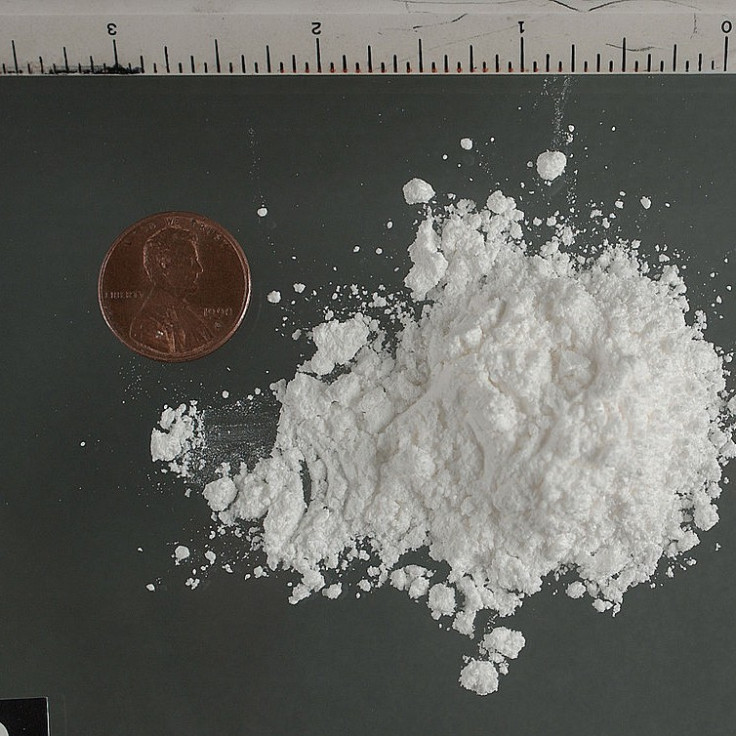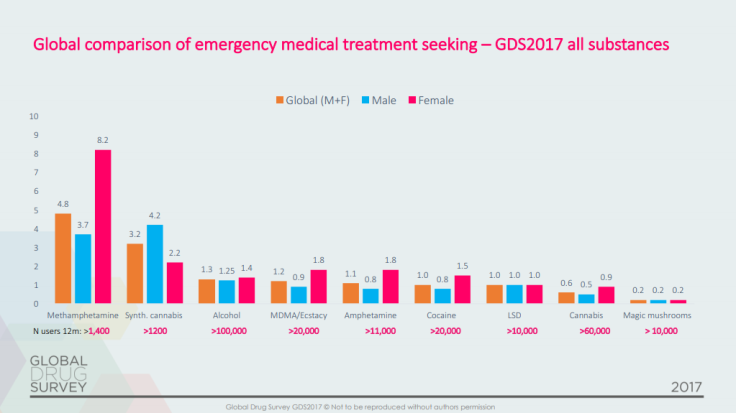Global Drug Survey 2017: What drugs are likely to hospitalise you - what you need to know about them
The survey found that alcohol has put more people in the emergency room than cocaine.

The Global Drug Survey (GDS) of 2017 that covered 50 countries around the world and involved 120,000 people, including 5,900 from the UK, rated recreational drugs. Based on the total number of emergency ward visits, recreational drugs were ranked from safest to most dangerous.
Recreational drugs that have sent the most number of people to the emergency room are methamphetamine or crystal meth, synthetic cannabis, and alcohol that sits at the bottom of the drug safety table, notes a report on the survey by Science Alert.
Magic mushrooms or "shrooms", were responsible for the least emergency hospital visits. Cannabis was placed second safest and surprisingly, Lysergic acid diethylamide (LSD) or acid and cocaine share the third place. Going up the list, amphetamines and MDMA, also known as ecstasy or simply "E", were left in the middle of the scale.
In the survey, it was found that over 10,000 participants used mushrooms but only 0.2% of them needed to go to the hospital because of their trip.
Researchers also pointed out that there is no completely safe recreational drug that is harmless. There is always going to be some consequence related to drug use, even if they do not land the user directly in the hospital. "Combined use [of mushrooms] with alcohol and use within risky or unfamiliar settings increase the risks of harm," the founder of the Global Drug Survey, addiction psychiatrist Adam Winstock said.
The greatest risk with mushrooms is consuming the wrong type and getting unwittingly poisoned as a result, the report adds.
The final score card on percentage of hospital visits caused by the drug:
- Mushrooms: 0.2%
- Cannabis: 0.6%
- LSD: 1.0%
- Cocaine: 1.0%
- Amphetamine: 1.1%
- MDMA: 1.2%
- Alcohol: 1.3%
- Synthetic cannabis: 3.2%
- Methamphetamine: 4.8%
While the number of users of drugs averaged out across genders, women were found to be more at risk than men in most cases.
If one should choose to take these drugs, the researchers say that it is vital that people know what they are getting into. There is no room for complacency, says GDS, even with what can be termed safe drugs. LSD, for example will affect the body for up to 12 hours, but cannabis will last only for a few hours.
The survey is not intended to encourage or condone the abuse of recreational drugs, notes GDS, rather a way to raise awareness of drugs and how they can be harmful. They also hope that surveys like this can be instrumental in reducing hospital intakes for drug related emergencies by educating the masses.

The GDS has been an ongoing effort since 1999 and they have been aiming to "make drug use safer regardless of the legal status" and keep all parties involved, from users and medical professionals to policy and law makers, informed about the effects of drugs.
The 2018 survey has recently concluded and the results are expected to be out in a few months.
The Samaritans provides a free support service for those who need to talk to someone in the UK and Republic of Ireland. Visit Samaritans.org or call 116 123 (UK) or 116 123 (ROI), 24 hours a day, 365 days a year. Visit this website to find a support phone number in your country.
If you or someone you know is suffering from depression, please contact a free support service at Mind.org.uk or call 0300 123 3393 (charges apply).





















